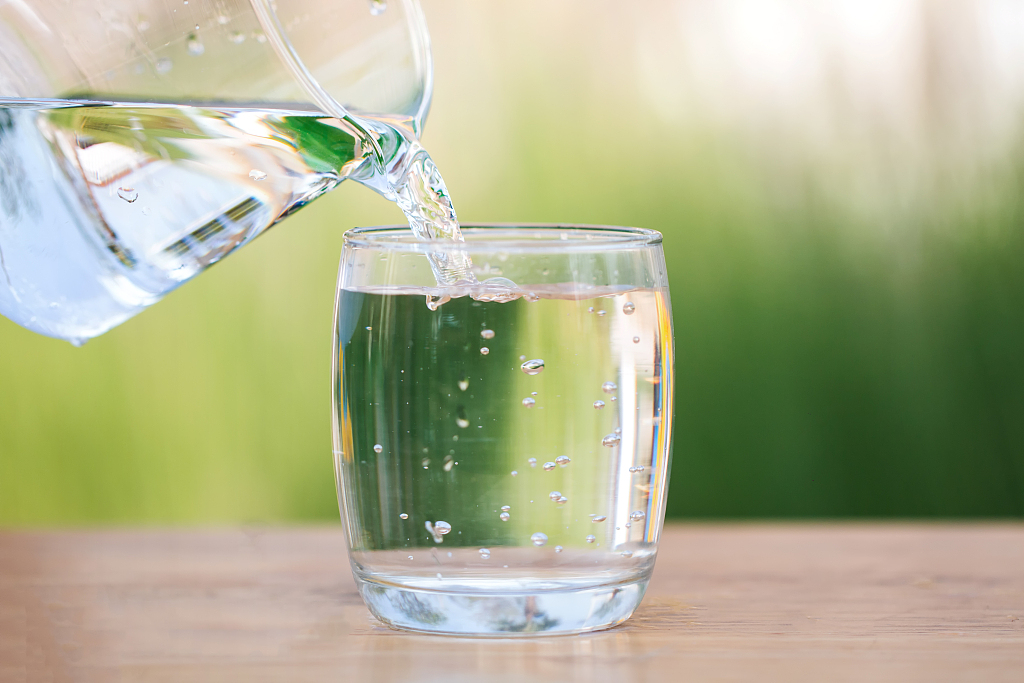CGTN
Environment 17-Mar-2023
Half of the money spent globally on bottled water, sales of which have exploded in recent decades, would be enough to provide universal access to clean drinking water from taps, according to a UN study released Thursday.
A shift in drinking habits away from bottled water would also lead to a big drop in plastics waste, as an estimated 85 percent of bottles end up in landfills, the report says.
However, the study's Canada-based authors flag that a misconception around the safety of both tap and bottled water plays a major role in individuals' preferences.
"The perception is that bottled water is the healthiest option," lead author Zeineb Bouhlel said.
"But we've shown that this is not necessarily the case, and people are paying a lot more for bottled water, from 150 to 1,000 times higher than for a liter of tap water," she said.
According to the study, contaminants have been found in hundreds of bottled water brands in more than 40 countries, often exceeding local or global standards.
Over the past decade, global bottled water sales jumped 73 percent to almost $270 billion and 350 billion liters.
Some 600 billion plastic bottles are produced each year, amounting to approximately 25 million tonnes of plastic waste.
In the Global North, consumers tend to buy bottled water because of its portability and a perception it is healthier and tastier than tap water, whereas in the Global South sales are usually spurred by a lack of reliable public water supplies.
Half of the money spent globally on bottled water, sales of which have exploded in recent decades, would be enough to provide universal access to clean drinking water from taps, according to a UN study released Thursday.
A shift in drinking habits away from bottled water would also lead to a big drop in plastics waste, as an estimated 85 percent of bottles end up in landfills, the report says.
However, the study's Canada-based authors flag that a misconception around the safety of both tap and bottled water plays a major role in individuals' preferences.
"The perception is that bottled water is the healthiest option," lead author Zeineb Bouhlel said.
"But we've shown that this is not necessarily the case, and people are paying a lot more for bottled water, from 150 to 1,000 times higher than for a liter of tap water," she said.
According to the study, contaminants have been found in hundreds of bottled water brands in more than 40 countries, often exceeding local or global standards.
Over the past decade, global bottled water sales jumped 73 percent to almost $270 billion and 350 billion liters.
Some 600 billion plastic bottles are produced each year, amounting to approximately 25 million tonnes of plastic waste.
In the Global North, consumers tend to buy bottled water because of its portability and a perception it is healthier and tastier than tap water, whereas in the Global South sales are usually spurred by a lack of reliable public water supplies.

Drinking water. /CFP
The report notes that the bottled water industry is mostly unregulated, as policymakers have been unable to keep pace with its rapid expansion.
This has brought risks such as "uncontrolled groundwater withdrawal for bottling," which could eventually lead to groundwater depletion or scarcity, the authors said.
Vladimir Smakhtin of the United Nations University Institute for Water, Environment and Health (UNU-INWEH) in Hamilton, Canada, said that two billion people still do not have access to safely managed drinking water.
The situation is worst in Sub-Saharan Africa, and globally it is compounded by the continuing expansion of bottled water markets, which he argued distracts attention and resources from public water systems development.
There has been some progress, with 74 percent of the world's population in 2020 using safely managed drinking water, up from 62 percent in 2000.
But "we are significantly off-track" to meeting a UN target of making drinking water universally available by 2030, said Smakhtin, a co-author of the report, adding that "the current trend is not sustainable."
"We must try to invest more in public water supplies to provide people with stable reliable water rather than bottled," he said.
The reports' authors also called for more transparency and legal measures that would compel bottled water companies to publicly disclose water volumes extracted and assess the environmental consequences of their activities.
Source(s): AFP
No comments:
Post a Comment